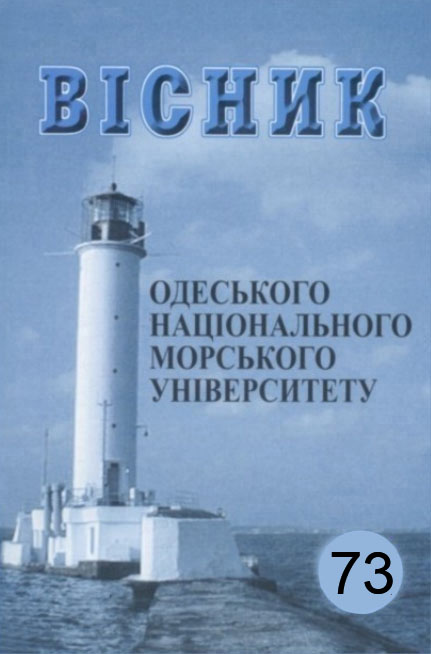Якість проєкту судна як критерій ефективності його роботи
##plugins.themes.bootstrap3.article.main##
Анотація
Розглянуті питання оцінки ефективності роботи судна як елемента транспортної системи. Показано, що судновласник повинен мати надійний інструмент для прийняття правильних рішень (оцінок) на етапі розгляду пропозиції або проєкту судна для мінімізації ризиків прийняття помилкових комерційних рішень. Запропоновано відносний критерій ефективності проєкту і шляхи його визначення для існуючого судна та для проєкту судна. Крім того розглянуто процедуру побудови рангового критерію ефективності проєкту, який в дослідженні залежить від ваги порожнього судна і бажаних характеристик гвинто-рульового комплексу. Розглянуті критерії застосовані для аналізу якості існуючих балкерів типу Panamax.
##plugins.themes.bootstrap3.article.details##
Як цитувати
Оберемок, Є., Бондар, А., & Демідюк, О. (2024). Якість проєкту судна як критерій ефективності його роботи. Вісник Одеського національного морського університету, (73), 212-224. https://doi.org/10.47049/2226-1893-2024-2-212-224
Розділ
Управління проектами і программами
Посилання
1. Vashedchenko A.M., Krotov O.I., Bondarenko O.V., Pankova O.V. Methods optimal ship design. Mykolaiv: NUK, 2011, 110 p.
2. Nekrasov V.A., Kabanova N.N. The problem of the functioning of a vessel operating on unsecured lines of transportation, in the problem of its design // NUK // Collections of scientific work of the NUK, No. 6 (423), 2008. Р. 35-40.
3. Kabanova N.N. Solving the stochastic task of optimizing the characteristics of a tramp ship // Vestnik ONMU. No. 34. 2012. Р. 172-183.
4. Aldo A. McLean, William E. Biles «A simulation approach to the evaluation of operational cost sand performance in liner shipping operations», WSC '08 Proceedings of the 40th Conference on Winter Simulation. Miami. Florida. December 07-10. 2008. Winter Simulation Conference © 2008. P. 2577-2584.
5. Jasper Faber, Maarten’t Hoen, Robert Vergeer, John Calleya «Historical Trends in Ship Design Efficiency, The Impact of Hull Form on Efficiency», Report, Delft, CE Delft, March 2016, Publication code: 16.7H27.23, 55 p.
6. «Improving Energy Efficiency of Ship sthrough Optimisation of Ship Operations», IAMU 2014 Research Project (No. 20140301), Istanbul Technical University (ITU), Published by the International Association of Maritime Universities (IAMU) Secretariat, Toranomon 35 Mori Building 7F, 3-4-10, Minato-ku, Tokyo 105-0001, Japan.
7. Каi Wang, Xinping Yan, Yupeng Yuan, Feng Li «Real-time optimization of ship energy efficiency based on the prediction technology of working condi- tion», Natio-nal Engineering Research Center for Water Transport Safety, Wuhan University of Technology, Wuhan, Hubei 430063, China, Transporta- tion Research. Part D 46. 2016. Р. 81-93.
8. Demidiuk O., Kosoy M., & Zaiets A. (2023). Determining basic characteris- tics of bulk carriers at the early stages of design // Eastern-European Journal of Enterprise Technologies, 6(1 (126). Р. 68-77.
9. VolkerBertram, H. Schneekluth «Ship design for efficiency an deconomy», 2-nd Edition, Вutterworth-Нeinemann, 1998. 224 p.
10. Lokukaluge P. Perera, Brage Moand Leifur A. Kristjánsson «Identification of Optimal Trim Configurations to improve Energy Efficiency in Ships». Nor- wegian Marine Technology Research Institute (MARINTEK), Trondheim. Denmark. August, 2015, Р. 267-272. In Proceedings of the 10th IFAC Confe- rence on Manoeuvring and Control of Marine Craft (MCMC2015), Copen- hagen.
2. Nekrasov V.A., Kabanova N.N. The problem of the functioning of a vessel operating on unsecured lines of transportation, in the problem of its design // NUK // Collections of scientific work of the NUK, No. 6 (423), 2008. Р. 35-40.
3. Kabanova N.N. Solving the stochastic task of optimizing the characteristics of a tramp ship // Vestnik ONMU. No. 34. 2012. Р. 172-183.
4. Aldo A. McLean, William E. Biles «A simulation approach to the evaluation of operational cost sand performance in liner shipping operations», WSC '08 Proceedings of the 40th Conference on Winter Simulation. Miami. Florida. December 07-10. 2008. Winter Simulation Conference © 2008. P. 2577-2584.
5. Jasper Faber, Maarten’t Hoen, Robert Vergeer, John Calleya «Historical Trends in Ship Design Efficiency, The Impact of Hull Form on Efficiency», Report, Delft, CE Delft, March 2016, Publication code: 16.7H27.23, 55 p.
6. «Improving Energy Efficiency of Ship sthrough Optimisation of Ship Operations», IAMU 2014 Research Project (No. 20140301), Istanbul Technical University (ITU), Published by the International Association of Maritime Universities (IAMU) Secretariat, Toranomon 35 Mori Building 7F, 3-4-10, Minato-ku, Tokyo 105-0001, Japan.
7. Каi Wang, Xinping Yan, Yupeng Yuan, Feng Li «Real-time optimization of ship energy efficiency based on the prediction technology of working condi- tion», Natio-nal Engineering Research Center for Water Transport Safety, Wuhan University of Technology, Wuhan, Hubei 430063, China, Transporta- tion Research. Part D 46. 2016. Р. 81-93.
8. Demidiuk O., Kosoy M., & Zaiets A. (2023). Determining basic characteris- tics of bulk carriers at the early stages of design // Eastern-European Journal of Enterprise Technologies, 6(1 (126). Р. 68-77.
9. VolkerBertram, H. Schneekluth «Ship design for efficiency an deconomy», 2-nd Edition, Вutterworth-Нeinemann, 1998. 224 p.
10. Lokukaluge P. Perera, Brage Moand Leifur A. Kristjánsson «Identification of Optimal Trim Configurations to improve Energy Efficiency in Ships». Nor- wegian Marine Technology Research Institute (MARINTEK), Trondheim. Denmark. August, 2015, Р. 267-272. In Proceedings of the 10th IFAC Confe- rence on Manoeuvring and Control of Marine Craft (MCMC2015), Copen- hagen.
